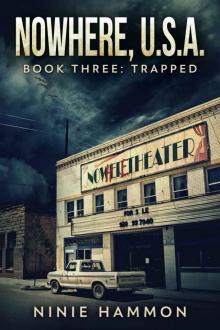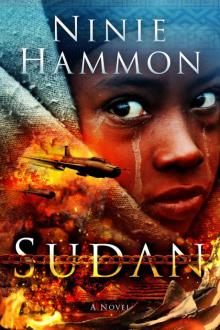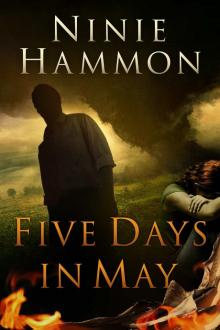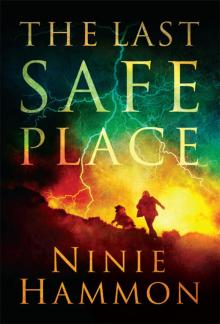- Home
- Ninie Hammon
Sudan: A Novel
Sudan: A Novel Read online
By
NINIE
HAMMON
Click FREE DOWNLOAD
Chapter 1
SOUTHERN SUDAN, March 2000
The sound of running feet dashing past her tukul was the first sign that something was not right in Dada Manut’s world. She’d been tickling baby Reisha’s tummy, sending the little girl into gales of giggles, but now she stopped and listened. She heard shouts in her sharply punctuated Lokuta dialect and then another sound, a sound she had never heard before, a high-pitched whine that couldn’t possibly have come from any animal or human she’d ever seen.
She snatched the naked baby into her arms and hurried outside. Her neighbors pointed at something in the eastern sky above the mountains. She squinted into the rising sun, but couldn’t make out the source of the strange noise that grew louder by the second.
She shifted Reisha to her hip, shielded her eyes with her left hand and peered into the glare. There! Now she could see it, see them. Two silver objects streaked across the sky toward her village, dropping lower and lower as they approached. The sound of them grew louder, rumbled like the thunder of a summer storm. Her heart began to hammer in her chest; her eyes widened in wonder—and growing dread.
Dada had never seen an airplane of any kind, much less a Soviet Antonov fighter. But she didn’t have to understand the incredible firepower bearing down on Nokot to sense the danger. Was this the death from the skies some of the other villagers talked about in hushed tones around their campfires at night, the tales of devastation too monstrous to comprehend? Information about the world outside their remote little valley was sketchy at best, but descriptions had filtered into Nokot of massive destruction and bloodshed--vague, shadowy stories as terrifying as bad dreams. Dada had dismissed the stories when she heard them, but now she began to back slowly toward the safety of her tukul, with its solid thatched roof and strong wooden support posts.
She didn’t make it inside before the first bomb fell.
The earth-shattering blast detonated less than 100 yards away, knocked her backward off her feet and slammed her to the ground so violently she almost lost her grip on Reisha. She lay there stunned, trying to catch her breath, her eardrums throbbing. In a daze, she turned in the direction of the blast, blinked her eyes and struggled to focus. But the world was not right. The stately balanite tree she and her friends had climbed when they were children was gone, replaced by a smoking crater of blackened earth with half a bloody zebu carcass draped over the edge. The rest of the animal was scattered in pieces around two other zebu that lay motionless nearby. Another blast hammered the earth on the other side of the village. Its roar mingled with the bleat of panicked goats as they stormed out of their pens, screaming caw-caws of terrified guinea hens and shrieks of women and children in a frantic stampede away from the carnage. Then she heard, as if from a great distance, the terrified screams of her infant daughter in her arms.
Dada staggered to her feet and lurched toward the doorway of her hut. Inside, both her sons sat on their sleeping mats, too frightened and bewildered to move. Dada knelt and pulled them close, held their trembling bodies tight, felt the staccato pounding of their little hearts against her chest.
Above the screams of the villagers and the cries of terrified livestock, she could hear the high-pitched whine of the fighter jets grow louder and louder. They were coming back. The strange otherworldly sound again became the rumbling of thunder, and Dada had time to wonder if she should run for cover in the woods or stay here where her husband and older son could find her. Then the bombs began to fall.
Four deafening explosions rocked the earth at two- to three-second intervals, cutting a swath of devastation 50 feet wide from one end of Nokot to the other. Huts that took direct hits vanished; others burst into flames. People and animals were indiscriminately blown apart, scattering body parts in a bloody hail in every direction.
Dada placed her shrieking baby on a sleeping mat but couldn’t get Isak and Kuak to sit down beside their sister; the boys were too terrified to let go of their mother. When she finally peeled them off and forced them to stay with Reisha, she stuck her head out past the elephant grass partition in the doorway. Her tukul was one of the few left standing. Four or five of her friends lay motionless on the ground nearby, and she could see the blood-soaked form of her seven-year-old nephew, Kagak, struggling to claw his way out of the remains of his family’s shattered, burning hut. But he could not crawl; both his legs had been blown off above the knee. His wailing mingled with the cries of the other injured villagers and animals in a symphony of terror and pain.
Dada’s eyes darted frantically from one horror to the next, taking it all in. Her heart boomed, and she could barely breathe through the rising knot of panic that gathered in her chest and flooded her mouth with a taste like blood. A purple light bloomed inside her head, and Dada felt hysteria crawling up the back of her throat, felt herself slipping, spiraling down toward the oblivion of total collapse. It was close, so achingly, temptingly close.
Everything in the world around her was wrong, all wrong! How could this be when the morning had started out like every other morning she had ever known? Dada’s mind suddenly reached out and grabbed hold of the morning, fiercely clutched the memory of normal and hunkered down into it. She left the acrid stench of burning bodies behind and snuggled up in a reality that was safe, a reality not defiled by exploding death, flames and blood.
She had awakened to the sound of the small herd of zebu lowing outside her tukul and had slowly raised herself on her elbow, careful not to disturb Reisha, curled up beside her breast. Two of her other children had been asleep on straw mats on the dirt floor of the one-room dwelling, but a third straw mat was empty. Her oldest son, Koto, was gone. He’d risen early to deliver the first of the zebu, large gray-and-white cattle with droopy ears, humps, and huge horns, to the pasturelands below their village.
Dada got up from the mat as quietly as she could and carefully nudged a tattered blanket closer to the baby to give her something to bump up against if she awoke. Then she edged past the sleeping forms of her two other children, and marveled again at how alike they were. There were times when even she would have struggled to tell them apart were it not for their lone distinguishing characteristic. Isak, the older of the eight-year-old twins by several minutes, had been born with a mark on the back of his right hand. To Dada, the mark was a shapeless blotch; to Isak, it was a butterfly! She paused briefly above each of the boys and gazed at them tenderly.
The face of the sun had just peeked over the Imatong Mountains on the border of Sudan and Kenya, and smiled down on the village where a half-dozen clans of migrating Lokuta tribals had settled 60 years earlier. Nokot now numbered 45 to 50 tukuls—round mud or straw huts with conical, thatched roofs.
Several women already squatted by their cast iron pots, stirring their family’s morning meal of porridge and cassavas. One of them was her sister, Bette, and she smiled a greeting. Koto was nowhere to be seen, so Dada walked over to their smoldering fire, picked up a stick and began to poke the embers, adding leaves and twigs, and blowing gently until flickering flames leapt from the red coals. Yesterday, she and Koto had gathered a large pile of acacia limbs, enough to fuel the family oven for several days. Like the rest of the families in their isolated village, they kept their fire stoked through the night and added dried zebu dung to produce a pungent smoke to hold at bay the seroot flies that carried the dreaded sleeping sickness. Everything in the village, every hut, mat, dried animal skin, thatched roof—and all the villagers, too—smelled like the smoke; the stink was woven into the fabric of their everyday lives.
Gauging from the position of the sun, she estimated that her husband, John, her father, brothers and the other Nokot men
had been in the millet fields for at least half an hour, planting the seeds that would produce a crop of sorghum. John’s face formed in her mind, and she smiled. She was married to a good man, and not all the women in the village could say that. Some of the men were lazy, but John worked extra hard because his withered right hand made simple tasks more difficult. No one knew exactly what had happened to him. He’d been only two years old, too little to tell his mother what had bitten him. A spider, maybe. A millipede. A snake. The list of suspects was huge. His mother had washed the wound with river water and put a poultice of leaves and boiled acacia bark on it. The toddler had been very sick for days; his hand had swollen to three times its normal size. When he recovered, he could no longer move his wrist, fingers or thumb, and over time, the hand withered and hung useless.
When John’s father had come to her father to negotiate a marriage, her father had been reluctant to agree, even when John’s father offered nine zebu. He’d feared John couldn’t properly care for Dada and a family, but Dada had pleaded with her father to approve. For years she had hoped John would be selected as her husband. He had kind eyes, and she’d watched him with his younger brothers and sisters. She knew he would be a good father. And she’d been right. When Isak had been born with the butterfly mark in the same spot on his hand where John had been bitten, Dada was certain that the spirit of John’s dead mother had put it there to protect her grandson from the fate of his father.
With the fire going strong, Dada sat back on her heels and relished the early morning. The cool air that caressed her skin was a welcome balm, a short, gentle reprieve from a life sentence of soaring temperatures in the glaring Sudanese sun. The stillness was just as soothing. She cherished the quiet. It nourished her soul, strengthened her for the demands of her family and her life. It was a good life—a gentle, hardworking husband, healthy children, enough to eat. She asked for nothing more. But she loved the stolen minutes of the morning because they were hers alone. In that delicious time before the village awoke, she was not fetching water in a clay pot balanced on her head from the river that flowed southwest into the White Nile, grinding sorghum for the next family meal, washing clothes, gathering wood, tending to a child or nursing an infant. For a brief moment in time each morning, Dada was alone with her thoughts, at peace with her world.
But the solitude of the moment as she knelt by the fire was soon shattered by the piercing cry of her youngest child. Dada poked a few more sticks into the growing flames and then stepped back inside the tukul. As she did, she pulled her left breast out from under her wrap, one long piece of red-and-purple cloth draped under her right arm, with the ends tied together in a knot over her left shoulder. She snuggled her daughter close and took care of motherly business.
Reisha sucked frantically for 15 minutes until she’d finally had enough. A single drop of milk hung suspended from Dada’s breast like a raindrop above the baby’s pink lips, but Reisha turned her head away. She was finished. Dada smiled as she reflected on how different her oldest and youngest children were—had been since the moment they were born. Koto had been easily satisfied, hardly demanded any attention at all, and ate solid food before he could walk. Now 15, Koto was tall for his age but thin, not yet filled out with the muscles of a man. He had a high forehead and wide, round eyes, and like the other members of the Lokuta tribe, he was as black as the night sky. Koto had always seemed vastly more mature than his years. His gaze was steady, his movements compact and economical, his temperament calm and confident—almost like a grown man in a child’s body. Ah, but this Reisha!
She placed the baby back on the sleeping mat, smiled and tickled her bare tummy. The baby’s giggles mingled with another sound. Running feet. Her neighbors shouting. A strange keening noise rumbling in the sky before...
No more than a few seconds after her mind had rejected it, Dada was sucked back into the reality of agonized screams and the stench of burning death, back into the deep, airless ditch of terror. And when she felt Isak wrap his small arms tight around her leg, his body trembling, she knew she had to stay there. She couldn’t abandon her children, couldn’t leave them alone in this nightmare while she escaped into hysteria. With every ounce of will she possessed, she forced herself to stand perfectly still, to calm down—to think.
John! She had to find her husband! He would know what to do. He would save them. She scooped Reisha into her arms, grabbed Kuak’s hand and told him to hold onto his brother. Together, they left the tukul and headed toward the sorghum fields where the men had been working. They cut behind two burning huts and came out into the open where Dada could see the fields, and her heart leapt with hope when she saw all the Lokuta men—40 or more of them—sprinting toward the village.
Then she saw why they were running.
Behind them, soldiers in jeeps bounced across the dark earth of the freshly planted fields, the weapons in their hands shiny in the early morning sun. The sharp crack of a rifle shot reached her ears a heartbeat before one of the Lokuta men crumbled and fell. Then another shot rang out. And another. Two more men fell. The gunfire grew more intense; the bodies kept falling, one after another, until there were no more targets left.
Dada did not see John, her father or brothers fall. She couldn’t make out anyone in the crowd of running farmers. But she knew John was there somewhere, knew that a bullet from one of the gunshots she’d heard had ripped into his back, and he lay dead in the field beside the bodies of all the other men in her family.
Kuak and Isak stood speechless beside their mother, too dumbstruck even to cry. But there was no time now for grief. The men in jeeps raced toward them, and Dada spun around and began to run with the boys back into Nokot.
In less than 10 minutes, the idyllic village in the green mountain valley had become a fiery deathtrap. Mothers grabbed their children and raced toward the river where they hoped to find safety in the marsh and reeds. Bellowing zebu and bleating goats ran helter-skelter in wild-eyed panic. Dada and the boys dodged burning huts, zigzagged past blast craters and stumbled over the body parts of dismembered villagers, as they made their way to the northern edge of Nokot to the field where Koto had taken their small herd of zebu that morning to graze.
Dada’s eyes frantically searched the field for her son, but there was no Koto. Her mind flatly refused to countenance the possibility that he had been hurt or killed. Koto was fine, she assured herself desperately; he had escaped the convoy of trucks carrying well-armed soldiers in combat fatigues that barreled across the field toward the village.
For just a moment, Dada stopped and stared at the approaching trucks bumping down the rutted path, scattering the terrified zebu and kicking up an ominous cloud of dust as they drew near. They reminded her of a pack of jackals she’d seen once, as they had circled a wounded doe and fawn. Then she turned to join the rush of other families that scrambled toward the river. But there was no escape there either. Soldiers ran up from that direction, too, cut off any flight, grabbed the screaming women and children and herded them into groups.
Dada stood very still on the dirt path she’d walked every day of her life. She realized she was utterly alone and totally helpless. With all her options gone, she turned toward the village and led her sons back to the only refuge she had left—their own tukul.
Once inside, Dada clasped the still screaming Reisha to her chest and sat the boys against the far wall of the hut. They obeyed her direction without protest. With identical faces that wore identical looks of abject terror, they scooted as far as possible back into the shadows and huddled close with their arms around each other. Then Dada placed herself between the boys and the doorway, and waited.
The sounds outside were hard to follow. She could make out some of the voices, but others shouted in a language she’d never heard before. She tried to soothe her frightened baby—Shhhhh! Shhhhhh! Hush now, shhhhhh—as she edged to the lone window her husband had cut in the side of the tukul and peered out. The entire village swarmed with soldiers. She saw one
of the trucks parked only three tukuls away. Already, groups of women and girls had been bound with lengths of rope, strung together like beads on a necklace.
She jumped back, startled, as a soldier ran by. He stopped in the doorway of the tukul where the newly wed Sama Pomwe and her husband, Karal lived. Karal had gone out with John that morning to work in the sorghum fields.
The soldier stood for a moment and stared into the tukul, then shouted something in his strange tongue and two other soldiers ran to him. The first soldier began to unfasten the pants of his uniform and stormed into the tukul with the other two close on his heels. Then Dada heard Sama scream, a high, piercing wail that went on and on and on.
Dada’s knees almost buckled out from under her, and she had to grab hold of the pole that supported the wall to stand up. She leaned there for a time, trembling violently; the sound of Sama’s cries sliced into her soul.
Then she slowly lifted her head and straightened up. Her hands steadied. The trembling stopped. Desperation had wedged steel down her spine.
She kneeled and whispered instructions to her sons, then picked up the backpack she’d used to carry each of her babies when she gathered sticks or food. She placed Reisha inside and tied it snugly across her shoulders. Reisha loved to ride in the backpack and her cries quickly changed to soft sniffles. Dada had counted on that; Reisha had to be quiet now. Then Dada peered carefully out the window. To her far left, soldiers herded a group of women and children into a circle next to a large truck as Dada readied herself for one final flight.
A detachment of soldiers went from hut to hut and dragged out the few remaining inhabitants. They had reached the tukul two down from hers where an older couple lived. If Dada meant to make a break for it, time was running out. With her baby daughter on her back, she gripped each son’s small hand, stepped to the door of the hut and prepared for the most important two minutes of her life.

 Trapped (Nowhere, USA Book 3)
Trapped (Nowhere, USA Book 3) Mad Dog (Nowhere, USA Book 2)
Mad Dog (Nowhere, USA Book 2) Black Water
Black Water Nowhere USA: The Complete Series: A Psychological Thriller series (Nowhere, USA)
Nowhere USA: The Complete Series: A Psychological Thriller series (Nowhere, USA) The Jabberwock
The Jabberwock Blue Tears
Blue Tears Blown Away (Nowhere, USA Book 6)
Blown Away (Nowhere, USA Book 6) The Hanging Judge (Nowhere, USA Book 4)
The Hanging Judge (Nowhere, USA Book 4) Sudan: A Novel
Sudan: A Novel Nowhere People (Nowhere, USA Book 7)
Nowhere People (Nowhere, USA Book 7) The Witch of Gideon (Nowhere, USA Book 5)
The Witch of Gideon (Nowhere, USA Book 5) Red Web
Red Web Gold Promise
Gold Promise All Their Yesterdays
All Their Yesterdays When Butterflies Cry: A Novel
When Butterflies Cry: A Novel Home Grown: A Novel
Home Grown: A Novel Five Days in May
Five Days in May The Memory Closet
The Memory Closet The Last Safe Place
The Last Safe Place The Knowing Box Set EXTENDED EDITION: Exclusive New Material
The Knowing Box Set EXTENDED EDITION: Exclusive New Material